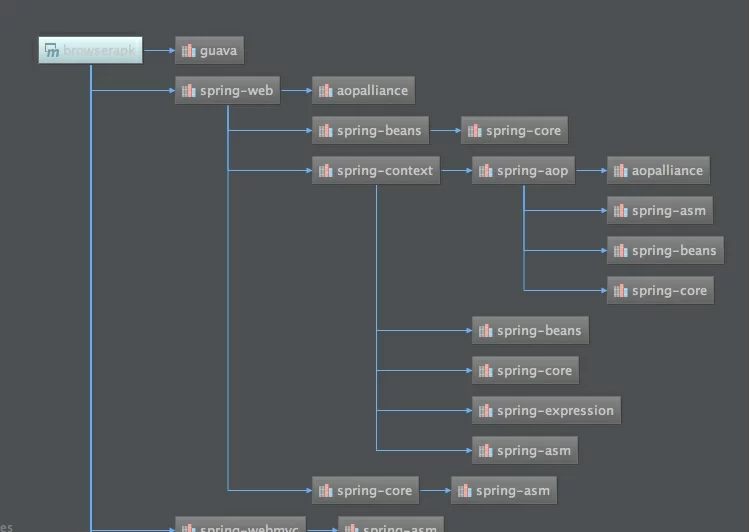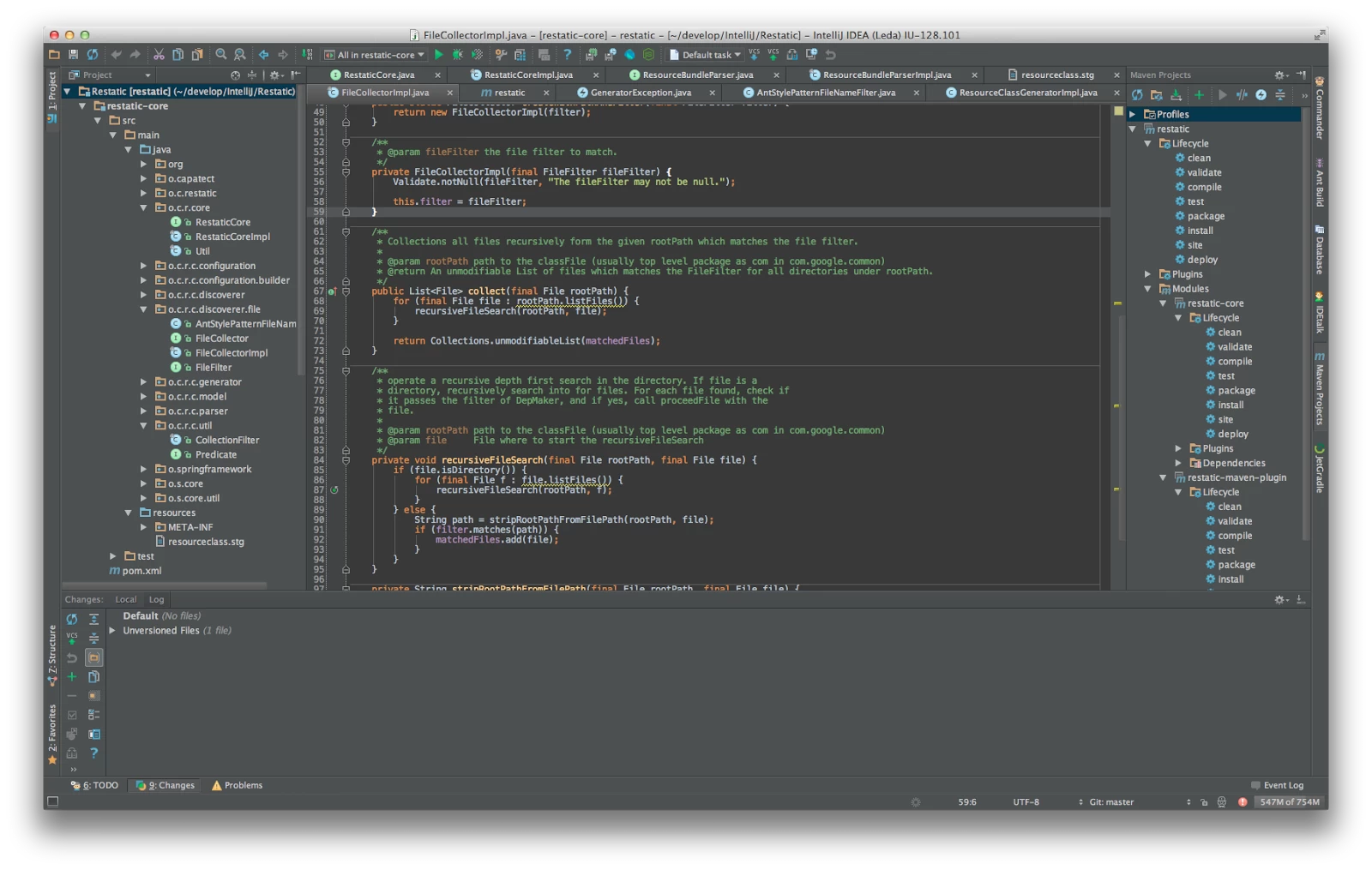Reasons for IntelliJ IDEA
Introduction
I often get the question why I use Intellij in favor of another IDE, in this case Eclipse. Most of the time I answer that question by demonstrating some features of IntelliJ and showing how integrated everything is. This got me thinking about what are the actual reasons that I use it. This post will try to make that clear and help others decide if the switch is worth it or not.
Some background
I had been a long time Eclipse (7+ years) user before I made the jump to IntelliJ.
Before Eclipse, I worked with Rational Application Developer, WSAD, JBuilder and Visual Age for Java. Compared to these IDE’s, Eclipse was a joy to use. I could, for example, generate getters and setters, which was not possible in one of the older IDE’s (we are talking about more than 10 years ago). Although I quite liked Eclipse I always thought there were some deficiencies. Mainly in the following areas:
- Why was there no core functionality bundled with the standalone Eclipse variant? For example Subversion and Maven integration.
- Why was it always painful to setup an Eclipse version to your liking with all the required plugins? With every new version I spent always nearly half a day setting up my IDE. This is unacceptable I think. The more plugins and functionality the harder it got.
- Updating to a new version was sometimes painful. Plugins that stopped working for example.
- I never quite liked the concept of a workspace. I already organize my projects on disk so I do not need a workspace concept.
- I did not like the idea of different perspectives. Why do I have to think about the context I am working in? For example: working with Java and Flex in one project. When I am in the Flex perspective my Java code completion/refactoring did work in Java files. Context should be file or even fragment driven.
Please note that the above are personal opinions and may vary between users. Despite of this I was quite productive in Eclipse and liked the performance of it. Also note that these observations are from a couple of versions back. Things may have changed.
Around 2007/2008, a colleague of mine introduced me to Intellij, I think it was version 7 back then. My first reaction was I don’t need another IDE. He showed me some features, like code inspections, and I said I would give it a try. My main obstacle back then was the price. That year I also gave a talk at the Dutch Java User group conference. Every speaker received a free IntelliJ license from JetBrains. I then decided I would give it a try. After the first two or three days I thought I would give up. I had to learn all new key-bindings and I was less productive. I persisted and after a week or so I begun seeing the benefits of it. After version 7 I upgraded to 8, 9 without any problem. Things could be different. At the moment I work with the latest version, 12.1 EAP. Below are some of my reasons why I do most (if not all) of my development work in IntelliJ.
Major features
- It is an integrated solution. I do a lot of different development work with a lot of different technologies, for example: Java, HTML/CSS/JavaScript, Android, Grails/Groovy, Flex, Subversion, Git, Maven, Ant etc. This is all possible with IntelliJ out-of-the box. There is no need to install separate plugins, which saves me a huge amount of setup time. Just download and install it and you’re good to go.
- The editor itself. I invest heavily in knowing all the shortcuts. By knowing all the shortcuts I can code very fast. The instant code completion (not having to hit Ctlr-space all the time) is a joy to work with. Just type a couple of characters and hit Tab to complete the code. When I generate code, the cursor almost always is in the correct position to begin typing again. No need to touch the mouse or whatever.
- Code inspections and analysis tooling build in. I find it important to keep my code clean and bug free. The build in inspections and the ability to auto solve them are a really nice addition. Besides this you also have a dependency matrix viewer to get a quick overview of the dependency structure of your application and a duplicate code checker.
- Live templates. Live templates greatly increase coding speed. To make the most of it, I highly recommend creating your own templates. This is very easy. Just select a piece of code and select Save as Live template from the Tools menu. Press Ctrl/Cmd+J to view the live templates.
- Maven/Gradle integration out of the box. Just import a Maven project and Intellij knows the modules, dependencies etc. You can easily generate a dependency diagram from the Maven pom file to view all the dependencies at a glance. See figure 1 for an example of the Maven dependency viewer.
- Some handy tools. I often use the database editor and the RESTful web service test utility. The database editor has code completion in SQL and table creation. With the RESTful web service tester you can easily test HTTP services. The response can then me immediately saved and formatted as JSON or XML.
- Powerful refactorings and structural search & replace. IntelliJ knows a lot about my code. For example in Android: when I rename an image in the values/hdpi folder, it also renames the corresponding images in the mdi and xhdpi folder but also updates my XML views and code references to that image.
- Tasks and Contexts. I use IntelliJ in combination with YouTrack (there are more issue trackers that IntelliJ can integrate with). It is really easy to start working on an issue. IntelliJ creates a new context that tracks the files that belongs to that specific issue. I can mark the issue in progress and when I commit my changes it takes the comments from the context and uses this as the commit comments. It also changes the status of the issue to resolved when done working on the issue. All from within the IDE itself, no need for context switching.

Smaller features
And then there are the smaller but just as important features which increase my productivity:
- Stacked clipboard. You can have multiple entries in your clipboard. Just hit Ctrl-Shift-V to show the clipboard stack.
- Column mode in the editor. This comes in handy when working with fixed structure files like CSV for example.
- Darcula theme. This is one of the best dark themes I encountered. A dark theme is especially useful when coding in the evening with the lights dimmed. It is less stressful for the eyes I think. See figure 2 for an example of the Darcula theme.
- Stack trace analyzer. Just copy a stack trace from the clipboard and IntelliJ analyses it and matches it with the code to easily navigate to the problem at hand.
- Unit test and coverage integration.
- And many more.

Final thoughts
This article describes the reasons why I use IntelliJ as my primary development tool of choice. Please note that this is my personal opinion. Also, this is obviously not an exhausted list. I would like to hear from you why you choose IntelliJ.
Reference: Reasons for IntelliJ IDEA from our JCG partner Jamie Craane at the Jamie Craane’s Blog blog.



I personnally like the overall appearance of the editor more than Eclipse. Also the shortcuts are much more intuitive.
I’m newbi in the programmers world, I’m currently working in netbeans. So, what IDE would be good for beginners like me?
Netbeans is good for beginners . Learn the concepts . Worry about the IDE later.
I use IntelliJ because it doesn’t crash all the time, like Eclipse.
One little thing:
Eclipse is for free and IntelliJ IDEA it is for money, so from my point of view it is normal that IntelliJ idea it is a better product.